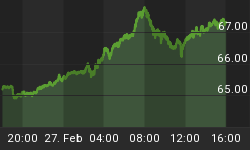In that deservedly-famous 2006 CNBC debate between Peter Schiff and economist Arthur Laffer (in which the latter manages to be both arrogant and wrong about literally everything), Laffer celebrates the fact that "we are outsourcing our monetary policy to China" (minute 5:17).
Alert listeners probably wondered what he meant by that, and also probably found the idea vaguely disturbing. But whatever it was we were doing, it turned out to be bad because within a year the global economy was in free-fall.
And now that strange, ominous concept has returned. But this time around we've apparently put our monetary fate in even less-stable hands:
Yellen Outsources U.S. Monetary Policy to the Financial Markets
(Bloomberg) - Fed Chair Janet Yellen told the Economic Club of New York on Tuesday that policy makers had scaled back the number of interest rate increases they expect to carry out this year after investors did the same.
She argued that the downgrading of rate expectations in the market had led to lower bond yields, providing the economy with needed support in the face of weaker growth overseas. The Fed then followed suit this month by reducing its anticipated rate hikes in 2016 to two from four quarter-percentage point moves projected in December.
"That's a good thing," said Lou Crandall, chief economist at Wrightson ICAP LLC in Jersey City, New Jersey, commenting on the sequence of actions. "Monetary medicine gets into the blood stream faster if the public can anticipate what the Fed's response to an economic shock will be."
There are pitfalls. Investors may become so impressed with their ability to influence Fed policy that they'll press for more stimulus than the central bank is willing to supply.
Forcing Fed
"The risk is that markets' perception of such continued accommodation will embolden them even more to try to force the policy hand of the Fed," Mohamed El-Erian, chief economic adviser at Allianz SE and a Bloomberg View columnist, said in an e-mail.
Indeed, investors in the federal funds market are betting that the central bank will raise rates just once this year, not the two times policy makers envisage.
The Fed's experience over the last six months also shows how difficult it can be for the central bank to align investors' view of optimal monetary policy with that of its own.
"It's a constant learning process by both the Fed and the markets," said Joachim Fels, global economic adviser for Pacific Investment Management Co., which oversees $1.43 trillion in assets.
Automatic Stabilizer'
Yellen used her spoken remarks though to extol the symbiotic relationship between the central bank and the financial markets. "This mechanism serves as an important 'automatic stabilizer' for the economy," she said.
Her comments come against the backdrop of continued criticism from Republican lawmakers and economists that the Fed is following a discretionary monetary policy that investors don't understand and is hurting the economy as a result. They want the Fed to follow a monetary policy rule, such as the one espoused by Stanford University professor John Taylor. It uses a simple equation to link changes in interest rates to movements in inflation and the economy.
With her remarks on Tuesday, Yellen was "implicitly defending the Fed's approach in the rules versus discretion debate as being one that's systematic" and understood by the markets, Crandall said.
I'm not going to try to explain (or even understand) any of this, except to say that putting oneself at the mercy of financial market sentiment seems a bit risky, given that Mr. Market is a well-known manic depressive.
It's also an inversion of the proper relationship between "money," or more accurately the monetary environment, and the players who act on that stage. Placing monetary policy in the hands of stock, bond, and derivatives traders is like putting the definition of meters and seconds into the hands of Olympic athletes: Within a few years the self-interest of the participants will make past records meaningless.
Some other fun analogies: putting criminals in charge of the legal system, putting kids in charge of the dinner menu, putting car makers in charge of auto safety testing, putting food companies in charge of nutritional reporting. All are recipes for incoherence if not disaster.
Apply the same process to interest rates and currency creation and the price signaling mechanism of the capital markets will go haywire. And without accurate price signals, modern market-based capitalism descends into chaos.















